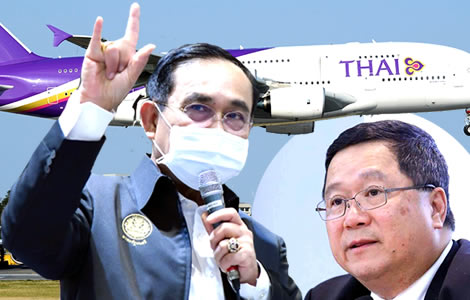The PM however has left the door open for future developments by saying that the government will let the rehabilitation process play out and will not interfere. The plan to bolster Thai Airways is reported to have the support of the Finance Minister and Economy and Energy Minister, Supattanapong Punmeechaow.
As Thai Airways approaches a crucial online meeting with creditors on Wednesday which could decide the fate of the flag carrier which has been a key player in Thailand’s foreign tourism industry since 1960, the Prime Minister Prayut Chan ocha, on Friday, attempted to dampen speculation that there is a hidden plan to inject ฿50 billion in funding into the airline, in a move that would see it reinstated as a state enterprise.

The ultimate fate of the national flag carrier, Thai Airways, currently negotiating a business rehabilitation process through the Central Bankruptcy Court, may be finally decided on Wednesday next May 19th when an online meeting of creditors attended by representatives of the Legal Execution Department of the court, will vote on the airline’s amended survival plan which was presented to creditors in March.
Last week’s meeting was aborted after 20 local creditors representing a substantial amount of the company’s total indebtedness, objected to the vote proceeding on the basis that the amended plan was only presented to creditors less than 24 hours before the vote.
Key ministers support the moves to restore Thai Airways to its former state enterprise status
It followed a crucial cabinet meeting last week at which it was reported there was some support from senior ministers including the Finance Minister Arkhom Termpittayapaisith and the Economic Chief and Energy Minister Supattanapong Punmeechaow, for a return of the airline to the state enterprise sector.
This move has been speculated on with reports also that the airline may have access to further funding to support its survival plan on the basis of it being government-owned.
March survival plan reported to be broadly supported but the future of the airline is still uncertain
This followed initial supportive remarks from key creditors including bondholders when the plan was unveiled in March.
However, everyone is clear that the airline is facing a very uncertain future given the disruption caused by the pandemic with the International Air Transport Association (IATA) predicting that airlines worldwide are set to lose over $47.7 billion this year.
Thai Airways itself posted a record loss of ฿141 billion for 2020 in recent months.
Moratorium on debt repayments and rationalised cost base to halt haemorrhage of cash
The proposal presented to creditors in March called for a moratorium on debt repayments and waiver of interest due on loans together with a rationalisation of the firm’s cost base which will see staff reduced by 33% from 21,000 to 14,000 by the end of the year.
This is to be accompanied by a small and more homogeneous aircraft fleet with a more efficient funding plan for aircraft in the skies and tighter control of maintenance costs.
State Enterprise Office chief resolutely opposed to Thai Airways coming back into the fold again
Nevertheless, it is reported that creditors are in favour of the airline returning to the state fold, something that is being resisted stoutly by the Director-general of the State Enterprise Policy Office, Ms Pantip Sripimol.
The key official has likened such a course and the use of public funds to an attempt to ‘fill up the sea’, a position supported by other ministers within the government particularly at a time when the country’s finances are stretched dealing with the Covid-19 pandemic.
Rehabilitation executives are supportive of the move saying it would put the airline in a stronger position
It is understood advisers close to the rehabilitation process are supportive of the move to see Thai Airways return to the status of a state enterprise which would be achieved by the government again taking up a further stake in the airline in a reverse of the process that took place before it sought bankruptcy protection in May 2020.
‘THAI would gain benefits under the Public-Private Partnership Act, such as contracts with Airports of Thailand for public infrastructure,’ the source said. ‘If Covid-19 does not impact THAI’s rehabilitation plan, we believe that it will be able to recover its business quickly because this is not the first time the company has faced losses.’
Status of the airline as a state-owned firm thought important to retain flight routes and privileges
Thai Airways is currently 49% owned by the Thai government and the Government Savings Bank and is a key partner in the worldwide Star Alliance group of airlines consisting of 26 airlines, many of them national carriers such as Singapore Airlines, Air Canada and Lufthansa with a flight network linking 1,300 airports.
Supporters of this move argue that since last year the firm’s status has been downgraded and that this may impact its ability to negotiate and protect key flight routes and concessions in the future.
They are also concerned that it may also impact the ability of the firm to access additional funds as it moves forward.
Airline’s already shot share price jumped by 28% since May 11th on the most recent circulating reports
Reports that additional funding would be provided to the airline and that it would regain support as a state enterprise had seen the share price of Thai Airways rise by 28% from May 11th to the close of business on Friday the 14th of May.
The shares have lost over 93% of their value since 2016.
PM’s statement left the door open, all eyes now await the outcome of the May 19th make or break vote
However, on Friday, the Prime Minister still left the door open when he told the press that the government will not become involved and will not provide any additional funding to the airline while the rehabilitation process is underway.
He did however suggest that this situation could change when the rehabilitation process swings into action.
‘I have decided that the government will not involve itself in the work of the rehabilitation plan administrators,’ he said. ‘The government will not provide any financial support. When the rehabilitation plan begins to be implemented, we’ll then decide how to proceed.’
At the end of April, following a critical meeting of key cabinet ministers including the PM to review the airline’s future, the acting Chief Executive Chansin Treenuchagron said a failure by the creditors to pass the rehabilitation plan would more than likely lead to the demise of the airline.
More than 50% of creditors must vote to approve the package currently before the Central Bankruptcy Court in Bangkok.
Join the Thai News forum, follow Thai Examiner on Facebook here
Receive all our stories as they come out on Telegram here
Follow Thai Examiner here
Further reading:
Thai Airways seeking business rehabilitation plan that has the unanimous support of it’s creditors
Deputy Transport Minister calls talks with Thai Airways, seeks new business plan in 3 months


















